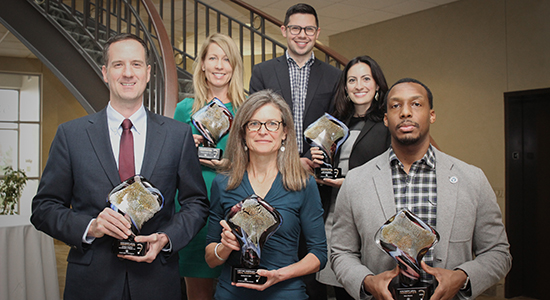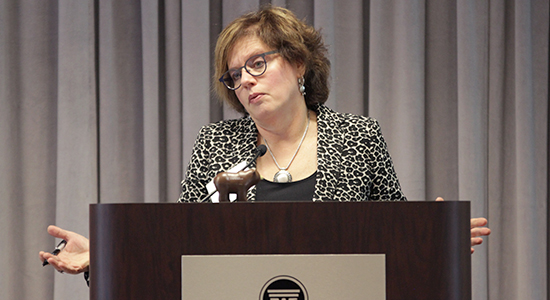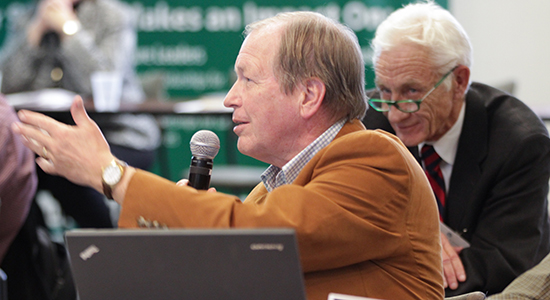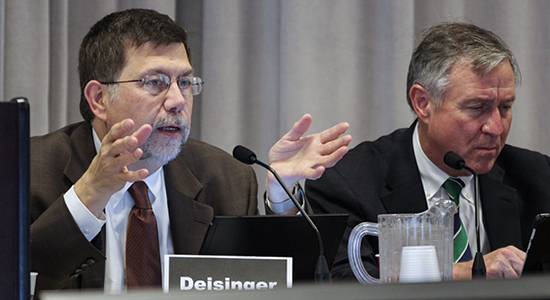
2016 Wisconsin Legal Innovators: First row, from left: William Caraher; Colleen Ball; Sam Owens. Second row, from left: Mary Turke, Rebecca Scheller. Third row: Sam Strauss.
Dec. 2, 2016 – At the request of the Board of Bar Examiners (BBE), the State Bar of Wisconsin’s Board of Governors (board) today voted to support rule changes that will clarify procedures for the rule on conditional admission to practice law in Wisconsin.
The 52-member board convened at the State Bar Center in Madison and voted to support petition 16-03 after hearing a presentation from BBE Director Jacquelynn Rothstein. The BBE filed the petition with the Wisconsin Supreme Court in September.
The board also recognized the 2016 Wisconsin Legal Innovators (noted below), heard reports and updates, and held breakout sessions to continue its work on governance, policy, and other business, including strategic planning.
Conditional Admission Rule Petition
In 2011, the Wisconsin Supreme Court adopted Supreme Court Rule (SCR) 40.075, which allows applicants with a record of conduct or behavior that would have otherwise rendered the applicant unfit to practice law an opportunity to gain conditional admission.
An applicant must satisfy essential eligibility requirements, possess the requisite good moral character, and demonstrate a record of rehabilitation from chemical dependency or successful treatment for mental or other illness, or for any other reason.
For instance, conditions could require the subject attorney to undergo medical, psychological or other treatment, or prohibit the use of alcohol or drugs (with random testing). The individual could also be required to be supervised or monitored.

Jacquelynn Rothstein, director of the Board of Bar Examiners (BBE), explains a proposed petition related to conditional admission to practice law in Wisconsin.
The initial period of conditional admission is 60 months, but may be extended for an additional year if the BBE finds good cause to extend the conditional admission period. The fact that someone is conditionally admitted remains confidential.
To date, the BBE has extended conditional admission to 33 individuals, and the vast majority have accepted. Of those, 17 successfully completed the conditional admission process and are now admitted with no conditions attached, Rothstein said.
Rothstein said that occasionally, there are individuals who relapse or otherwise incur minor infractions of their conditional admission agreements.
In those cases, the BBE works with the State Bar’s Wisconsin Lawyers’ Assistance Program (WisLAP) to help and redirect those individuals towards compliance.
However, for those attorneys who become substantially noncompliant, the BBE votes to revoke conditional admission. Individuals have an opportunity to show cause, to the supreme court, why their law license should not be suspended or revoked.
But the current rule does not provide clear guidance on how substantial noncompliance cases should be handled procedurally, and does not contain a clear means for those attorneys interested in pursuing reinstatement after suspension or revocation.
“The existing rule does not contain a process by which attorneys’ noncompliance with conditional admission should be addressed once the [BBE] has voted to revoke the underlying conditional admission agreement,” Rothstein told the board.
The BBE filed petition 16-03 to make those clarifications. The proposed amendments would clarify that the BBE can modify, extend, or revoke conditional admission agreements. The BBE could also take other appropriate action, based on substantial noncompliance, such as notification to the Office of Lawyer Regulation (OLR).

Mark Petri, Mequon, a Senior Lawyers Division representative on the State Bar's Board of Governors, asks questions on a petition related to conditional admission to practice law.
The petition generally codifies the current practice when the BBE votes to revoke a conditional agreement. The BBE is required to file a Motion and Order to Show Cause, and the subject lawyer has 20 days to file a response. The supreme court may decide the matter on written submissions, without a hearing, or refer the case to a referee.
If the court issues an order of license suspension or revocation, the fact that the individual was conditionally admitted is no longer confidential. However, the suspended or revoked attorney may petition for reinstatement under current reinstatement rules.
Petition 16-03 will now move forward with State Bar support. The supreme court has not scheduled a public hearing on the petition, but is expected to do so in 2017.
Wisconsin Legal Innovators
The board also recognized six recipients of the 2016 Wisconsin Legal Innovator award: Colleen Ball; Sam Owens; Marry Turke; Sam Strauss; William Caraher; and Rebecca Scheller. Through the “That’s a Fine Idea: Legal Innovation Wisconsin” initiative, in its third year, the State Bar annually showcases innovation in the legal community. The award is presented by the Communications Committee.
“There are a lot of disrupters out there to the traditional delivery of legal services,” said Tom Watson, of the State Bar’s Communications Committee. “As a profession, we have to embrace those disrupters as opportunities.”
Colleen Ball, an appellate attorney at the State Public Defender’s Office, received the “Lifetime Innovator” award for the continuous pursuit and implementation of new ideas.

State Bar President Fran Deisinger (left), flanked by President-elect Paul Swanson, comments on a proposed petition that relates to conditional admission to the practice of law.
Most recently, she led the way in expanding the Appellate Practice Section’s pro bono program by creating the online Virtual Appellate Help Desk to assist pro se litigants with civil cases in the Wisconsin Court of Appeals.
She urged continued efforts to leverage technology to improve access to justice. “You will soon hear about the ‘appellate app’ that Georgetown Law School is developing for us,” said Ball, noting that State Bar Pro Bono Coordinator Jeff Brown helped the section connect with a competition where Georgetown students compete to build legal apps.
“We can’t stop here,” Ball said. “There’s so much more to do, so many more people to reach. We need to find ways to reach out beyond the legal profession.”
She suggested an annual event to connect lawyers, clients, law schools, and other professionals to find solutions to problems concerning the delivery of legal services.
Other Business
The board supported the appointment of Anthony Gray, Madison, to fill the remaining term of District 9 Gov. Catherine Dorl, who recently resigned. Gray’s term ends June 30, 2018.
The board’s Strategic Planning Committee revised the committee’s roles and responsibilities in light of the State Bar’s new strategic planning process and priorities, and the board approved.
Upon request, interested members may obtain a copy of the minutes of each meeting of the Board of Governors. For more information, contact State Bar Executive Coordinator Jan Marks by emailor by phone at (608) 250-6106.
